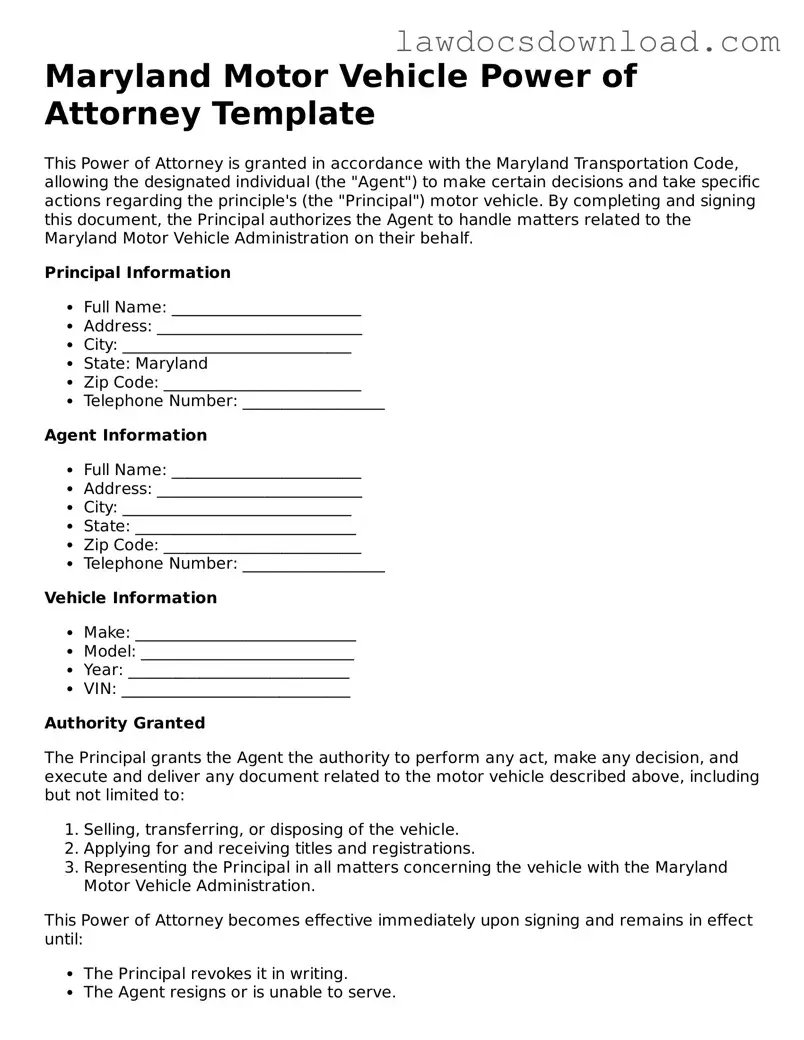The Maryland Motor Vehicle Power of Attorney (POA) form shares similarities with a General Power of Attorney form. Both documents empower an individual, known as the agent, to make decisions on behalf of another person, referred to as the principal. However, while the Motor Vehicle POA is specifically focused on vehicle-related transactions, a General Power of Attorney can cover a wide range of activities, including financial and legal decisions.
Comparable to the Healthcare Power of Attorney, the Maryland Motor Vehicle POA also designates an agent to act on another's behalf. In contrast, the Healthcare POA is specifically for making medical decisions when the principal is unable to do so themselves. This distinction underscores the importance of each form addressing different realms of a person's life—healthcare versus motor vehicle matters.
Like the Maryland Motor Vehicle POA, a Durable Power of Attorney (DPOA) designates another individual to act on one's behalf. The critical difference lies in the durability aspect; a DPOA remains in effect even after the principal becomes incapacitated. This variance highlights the broad applicability of the DPOA, including situations beyond the scope of vehicle transactions.
The Limited Power of Attorney (LPOA) form bears resemblance to the Maryland Motor Vehicle POA as well, since both grant specific and restricted powers to an agent. Yet, an LPOA could apply to various scenarios outside of motor vehicle issues, illustrating how specific powers granted can be tailored to different circumstances.
Similarly, a Real Estate Power of Attorney, which grants an agent authority to handle real estate transactions on behalf of the principal, shares the concept of designated representation found in the Maryland Motor Vehicle POA. Both documents facilitate transactions on behalf of the principal, though they focus on distinct areas—real estate versus motor vehicles.
The Springing Power of Attorney, which becomes effective only under conditions specified by the principal, often related to the principal's health, contrasts with the Maryland Motor Vehicle POA's immediate effectiveness. Despite this difference, both documents ensure that an individual has selected a trusted agent to act on their behalf under certain conditions.
A Financial Power of Attorney, much like the Maryland Motor Vehicle POA, empowers an agent to handle financial matters. However, its scope is broader, covering a vast range of financial actions beyond vehicle-related transactions. This illustrates the focused nature of the Motor Vehicle POA compared to the extensive reach of financial powers.
Similar to the Maryland Motor Vehicle POA, a Child Care Power of Attorney allows parents to appoint an agent to make decisions regarding their child’s care. This comparison highlights the POA's versatility in representing interests, ranging from children's welfare to handling specific assets like vehicles.
Lastly, the Tax Power of Attorney, specific to authorizing an individual to handle another’s tax matters, shares the principle of designated representation with the Maryland Motor Vehicle POA. Both enable an agent to act in specialized capacities on behalf of the principal, showcasing the adaptability of power of attorney forms to suit various needs.

